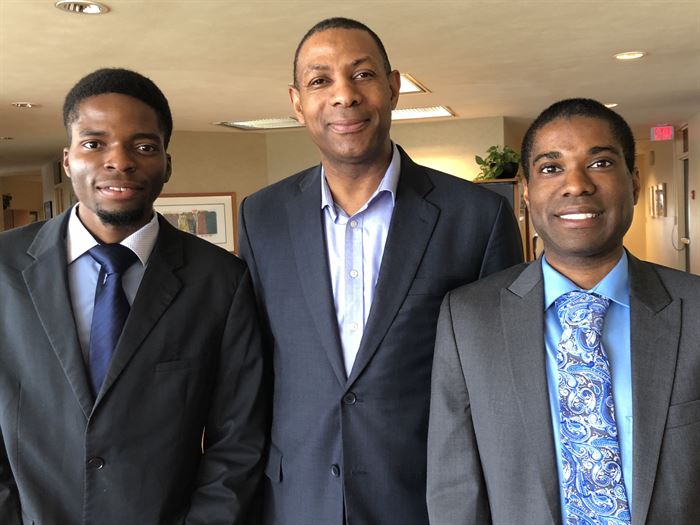CONTACT:
Jeanan Yasiri Moe, Director of Strategic Communications
[email protected] | 608.960.9892

MADISON, Wis. – Before the summer recess, WARF was host to a meeting of minds as two young scholars at the frontiers of computing had the opportunity to meet the alumnus investing in their success.
Andrew Lambert (M.S., ECE ’18) and Oghenefego Ahia (M.S. candidate ’19) are recipients of the prestigious Winslow Sargeant Fellowship, which supports underrepresented minorities pursuing advanced degrees in electrical and computer engineering.
Sargeant (Ph.D., ECE ’95) is senior vice president of partnerships and development (USA) for the International Council for Small Business (ICSB). A successful entrepreneur and policymaker, he was first elected to the WARF Board of Trustees in 2005.
He said his vision for the fellowship, which provides a stipend and covers tuition among other expenses, is all about passing it forward: “The analogy is being on the top floor, and sending the elevator back down for others.”
Lambert, from Spring Valley, New York, discussed his work on experimental quantum bits or ‘qubits’ – an essential step towards realizing the “exponential power” of quantum computing. He said the Winslow Sargeant Fellowship has had “a million implications,” like landing a summer internship at Fermilab in Illinois.
“Without it I wouldn’t be here,” Lambert said. “And if I weren’t here, I wouldn’t be able to go to Fermi.”
Ahia, from Lagos, Nigeria, described his passion for computer architecture, particularly hardware-software co-design. He said the fellowship has enabled him to focus on his research and “not have to worry” about financial strain.
He said he was attracted to UW–Madison because, at the time he was applying, it was one of a handful of universities in the world granted access to a computing platform he wanted to explore. “To have at your disposal tools at the frontier of technology was a big pull.”
Sargeant shared his experience both personal and professional – as a young man from Boston researching fiber-optics and optical detection at UW–Madison in the 1990s, then attaining success as an entrepreneur developing circuit technology during the formative years of the internet.
A WARF-funded fellowship changed the course of his own life, Sargeant said, allowing him to put his dreams over basic necessity. Now, as a WARF Trustee giving the gift of education, “life has come full circle.”
“The [Winslow Sargeant] Fellowship was matched with WARF funds,” he noted. “This is another example of how WARF supports excellence in a diverse and inclusive graduate student body.”
Also present at the meeting were Todd Hollister – Director of Development, UW Foundation; Ian Robertson – Dean, College of Engineering; Susan Hagness – ECE Department Chair, College of Engineering, and John Booske – outgoing ECE Department Chair, College of Engineering.
United Nations special event
In June, Sargeant’s organization, the ICSB, issued its inaugural report on the state of micro, small and medium-sized enterprises (MSMEs), which shoulder an estimated 90 percent of global economic activity.
From gender equality to eliminating hunger, MSMEs are on the front lines of the UN Sustainable Development Goals. Creating a “shared future” for these enterprises in a time of technological and social flux was the focus of a special event hosted by ICSB at UN Headquarters in New York.
That event featured 400 attendees from more than 40 countries. Attendees included entrepreneurs, policy makers, researchers and educators, as well as a business development manager for Amazon. Laura Heisler, WARF’s director of programming, was a keynote speaker.
The UN has called upon MSMEs and entrepreneurs globally to create an estimated 600 million jobs over the next 15 years – an ambitious goal as economies around the world reckon with major disruptions posed by Blockchain and artificial intelligence, retail and service consolidation, and social integration challenges.
In his remarks, Sargeant deliberated on the future of work in an era of “creative destruction” brought about by new technology.
“The 4th industrial revolution represents news ways that technology will interact with the human body and how convergence will take place across biological and the physical worlds. What is not known is how the work relationship of employee and employer will be affected…The use of artificial intelligence (AI) has the potential to eliminate a significant portion of the jobs that are currently done by people.”
“Some have estimated that by 2030, as many as 30% of the jobs currently available in 2018 will be eliminated…MSMEs are expected to take up the slack that will develop from dislocations of employees due to AI. Small businesses, as a whole, are generally more adept at dealing with change.”
Heisler discussed WARF’s key role at the intersection of academia and business. She noted the millions of lives improved by inventions arising from UW–Madison research. From improved crops to lifesaving medical devices, many of these inventions enable the Sustainable Development goals established by the United Nations.
“As we look ahead to the next 90 years, we are renewing our focus on expanding the culture of entrepreneurship on the campus and in the community,” Heisler said. “We recognize that for many technologies, MSMEs are the best solution for realizing their impact.”
The UN has designated June 27 as MSME Day.
About WARF
The Wisconsin Alumni Research Foundation (WARF) helps steward the cycle of research, discovery, commercialization and investment for the University of Wisconsin–Madison. Founded in 1925 as an independent, nonprofit foundation, WARF manages more than 1,900 patents and an investment portfolio of $2.7 billion as it funds university research, obtains patents for campus discoveries and licenses inventions to industry. For more information, visit warf.org.
About the International Council for Small Business
Founded in 1955, the International Council for Small Business (ICSB) was the first international membership organization to promote the growth and development of small businesses worldwide. The organization brings together educators, researchers, policy-makers and practitioners from around the world to share knowledge and expertise in their respective fields. The ICSB is a nonprofit organization; for more information, visit icsb.org.
###